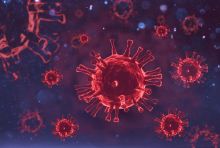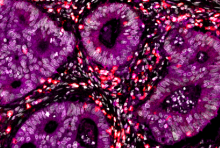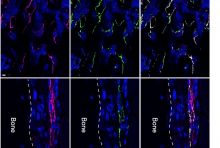
September 28, 2021
Convalescent plasma did not reduce the risk of intubation or death for hospitalized COVID-19 patients in a large, international clinical trial conducted by Weill Cornell Medicine and NewYork-Presbyterian investigators in collaboration with lead investigators at McMaster University.

September 23, 2021
Turning off a defense mechanism that protects colorectal cancer tumors from being discovered by immune cells could be a possible strategy for treating the disease, according to a new study by Weill Cornell Medicine investigators. Because immunotherapy reactivates immune cells near a tumor, but fails when those cells aren’t present in significant numbers, the new approach could potentially complement this type of treatment or work on its own.
September 14, 2021
Congratulations to the dozens of WCM Pathology members who co-authored or volunteered for the new study, "More rapid, robust and sustainable antibody responses to mRNA COVID-19 vaccine in convalescent COVID-19 individuals," in The Journal of Clinical Invesitgation.

September 1, 2021
A cellular protein whose normal function appears to suppress bone formation may be a potential new target for treating osteoporosis, suggests a collaborative study led by Weill Cornell Medicine and NewYork-Presbyterian investigators.
July 30, 2021
Congratulations to Sarina Yang, PhD, a 2021 ASCP 40 Under Forty Honoree! What an achievement!He Sarina Yang, PhD Assistant Professor of Pathology and Laboratory MedicineThe ASCP 40 Under Forty program recognizes members under the age of 40 for their achievements and leadership qualities that are making an impact on pathology and laboratory medicine. Forty pathologists, laboratory professionals and residents are chosen annually through an application or nomination process. The program has recognized worthy members of the laboratory team both nationally and internationally. From the 40 Under...
July 24, 2021
Five Weill Cornell Medicine instructors and junior faculty seeking to pursue independent research careers have received 2021 JumpStart Career Development awards.Nicholas Brady, PhD Instructor in Pathology and Laboratory MedicineThe Jumpstart Program supports investigators during the critical period of career development spanning from the completion of research training to the early years on faculty at Weill Cornell Medicine. By providing one year of initial funding, with the opportunity of up to $300,000 over three years, the program aims to assist investigators as they apply for a National...
June 22, 2021
The residents are pleased to announce our selection of Dr. Matthew Greenblatt as the M. Desmond Burke Teaching Award winner for 2021.Matthew B. Greenblatt, MD, PhD Associate Professor of Pathology and Laboratory MedicineDr. Greenblatt, who oversees the CP arm of the residency, is extremely dedicated to the teaching of all the residents. He is always present at every noon conference and runs CP call review and CP-wide problem/teaching sessions (including resident favorite CP Jeopardy) that extend beyond his specific area of clinical practice.On service, he caters his teaching to individual ...
May 17, 2021
A new understanding of the interaction of two proteins and their role in fat burning and storage may one day have implications for the treatment of obesity and associated diseases such as diabetes and cancer, according to Weill Cornell Medicine investigators.Their preclinical research, published May 17 in Nature Communications, explores how the proteins p62 and NBR1 influence thermogenesis, or fat burning to produce body heat, in brown adipose tissue (BAT), a form of fat.Jorge Moscat, PhD Professor of Pathology and Laboratory Medicine“The increasing prevalence of obesity is alarming because...
April 29, 2021
Women who receive COVID-19 mRNA vaccines produced by Pfizer-BioNTech or Moderna while in their third trimester of pregnancy generate a strong immune response and pass protective antibodies through umbilical cord blood to their babies, according to a study conducted by Weill Cornell Medicine and NewYork-Presbyterian researchers, published April 28 in Obstetrics & Gynecology.Yawei (Jenny) Yang, MD, PhD Assistant Professor of Pathology and Laboratory MedicineResearchers studied 122 women who received the two-dose Pfizer or Moderna mRNA vaccine during pregnancy and analyzed the antibody...
April 7, 2021
A team led by investigators at Weill Cornell Medicine and NewYork-Presbyterian has used advanced technology and analytics to map, at single-cell resolution, the cellular landscape of diseased lung tissue in severe COVID-19 and other infectious lung diseases.In the study, published online March 29 in Nature, the researchers imaged autopsied lung tissue in a way that simultaneously highlighted dozens of molecular markers on cells. Analyzing these data using novel analytical tools revealed new insights into the causes of damage in these lung illnesses and a rich data resource for further...

